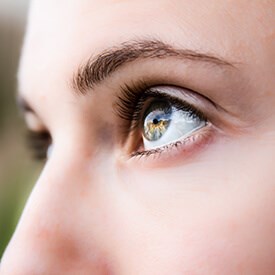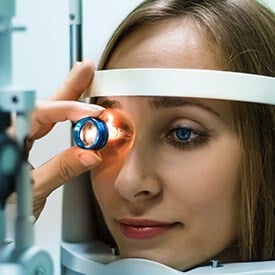- Procedure Name:
- Eye Exams Service
Comprehensive eye examinations give our team the opportunity to fully assess your overall eye health and look for any underlying issues or diseases.
- Procedure Name:
- Myopia Service
Myopia, also known as nearsightedness, is a commonly occurring eye condition that causes objects to appear blurry and unfocused from far away.
- Procedure Name:
- Hyperopia Service
Also called farsightedness, hyperopia is a refractive error that causes patients of any age to have blurry vision when trying to see objects up close.
- Procedure Name:
- Presbyopia Service
Age-related vision loss develops when the eye of the lens becomes stiff and can't adjust its shape effectively to view objects at varying distances.
- Procedure Name:
- Lazy Eye (Amblyopia) Service
Amblyopia, or lazy eye, is usually defined as poor vision in one eye that causes that eye to wander or causes the eyes to not work together properly.
- Procedure Name:
- Common Eye Infections Service
There are a number of infections that can have different effects on your eyes and overall eye health, and each has its own unique treatment options.
- Procedure Name:
- Eye Allergies Service
Eye allergies can be caused by a range of airborne allergens, including dust, pet hair, pollen, and other seasonal or environmental factors.
- Procedure Name:
- Dry Eye Syndrome Service
Dry eye syndrome is a chronic condition that develops when there is a shortage of tears being produced. Thankfully, there are many treatments.
- Procedure Name:
- Contact Lenses Service
Patients of nearly all ages with refractive errors, like myopia or hyperopia, can receive contact lenses through our office to correct their vision.
- Procedure Name:
- Eyeglasses and Sunglasses Service
Receiving customized eyeglasses and sunglasses suited to your unique prescription will help you see better and clearer on a day-to-day basis.
- Procedure Name:
- LASIK Service
One of the most widely performed eye surgeries in the world, LASIK is an advanced procedure that reshapes the cornea to correct refractive errors.
- Procedure Name:
- PRK Service
Photorefractive keratectomy, often shortened to PRK, is a laser vision correction surgery that may be right for those who aren't candidates for LASIK.
- Procedure Name:
- Refractive Lens Exchange Service
For patients with more severe refractive errors, a refractive lens exchange replaces the natural lens with an IOL to improve the patient's sight.
- Procedure Name:
- Glaucoma Explained Service
Glaucoma is a group of eye diseases that negatively impact a person's overall eye health and visual acuity, often leading to blindness if not treated.
- Procedure Name:
- MIGS Service
Minimally invasive glaucoma surgery encompasses a range of technologies and techniques that are utilized to eradicate glaucoma and improve eye health.
- Procedure Name:
- Glaucoma Laser Treatment Service
Using the most advanced technology available in the vision industry, our ophthalmologists are able to lower intraocular pressure by various methods.
- Procedure Name:
- Glaucoma Surgery Service
The Kahook Dual Blade goniotomy and trabeculectomy are effective glaucoma surgeries that lower intraocular pressure by reducing built-up eye fluid.
- Procedure Name:
- Cataracts Explained Service
Cataracts develop when the proteins that make up the eye's natural lens start to degrade, which causes the lens to cloud and leads to blurry vision.
- Procedure Name:
- Cataract Surgery Service
Traditional cataract surgery utilizes fine, handheld tools to create precise incisions and remove the cataract lens.
- Procedure Name:
- Refractive Cataract Surgery Service
Utilizing state-of-the-art technology, refractive laser cataract surgery removes a clouded, damaged lens and fixes astigmatism.
- Procedure Name:
- YAG Laser Capsulotomy Service
YAG capsulotomy is performed if the capsule that holds the lens in place becomes clouded after the patient has received cataract removal surgery.
- Procedure Name:
- Cataract Lens Options Service
During cataract surgery, an artificial intraocular lens (IOL) is used to replace a natural lens that has developed a cataract and needs to be removed.
- Procedure Name:
- Flashes and Floaters Service
Brought on by the thickening and shrinking of the vitreous fluid, flashes and floaters take the form of flashes of light and little black "squiggles."
- Procedure Name:
- Retinal Tears and Detachments Service
Retinal tears and detachments typically occur with the vitreous fluid within the eye begins to shrink, which happens naturally as men and women age.
- Procedure Name:
- Diabetic Retinopathy Service
One of the leading causes of blindness in adult patients with diabetes, diabetic retinopathy causes damage to the blood vessels within the retina.
- Procedure Name:
- Macular Degeneration Service
Macular degeneration is a progressive eye disease that affects the macula (the central area of the retina) and has two forms — dry type and wet type.
- Procedure Name:
- Retinal Laser Treatment Service
Using a panretinal photocoagulation laser, our ophthalmologists can treat a range of retinal conditions ranging from the common to the more complex.
- Procedure Name:
- Retinal Surgery Service
Retinal surgery comprises a range of advanced techniques that address moderate to severe instances of retinal tears, detachments, and other issues.
- Procedure Name:
- Cornea Diseases and Disorders Service
A number of corneal conditions and abnormalities can often develop in patients with a family history of cornea disease, such as keratoconus.
- Procedure Name:
- Entropion and Ectropion Repair Service
Entropion and ectropion eyelid repair is a highly personalized surgery designed to restore the natural shape and curvature of the affected eyelids.





























